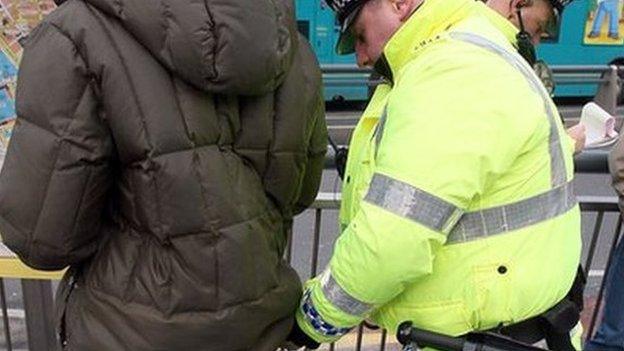Most Police Scotland stop-and-searches unsuccessful
- Published
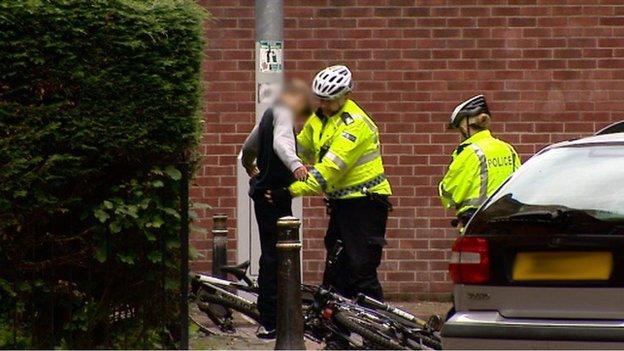
Police Scotland carried out 76,135 stop searches in August and September 2014, including 42,826 consensual searches
The majority of stop-and-searches conducted by Police Scotland failed to recover any illegal items, according to data obtained by BBC Scotland.
Nearly 85% of the 42,826 consensual searches carried out in August and September 2014 were unsuccessful.
This type of search - which does not require reasonable suspicion - comprised two-thirds of all searches during the period.
Police Scotland said the tactic had contributed to a reduction in crime.
The data, obtained through a Freedom of Information request, revealed that a total of 76,135 searches were carried out over the two-month period.
Police Scotland has failed to hand over the requested figures for the months between January and July, as well as the age data, saying this was due to technical issues with its database management system.
You can explore the stop-and-search data using the SEARCHABLE DATABASE, external developed by BBC Scotland.
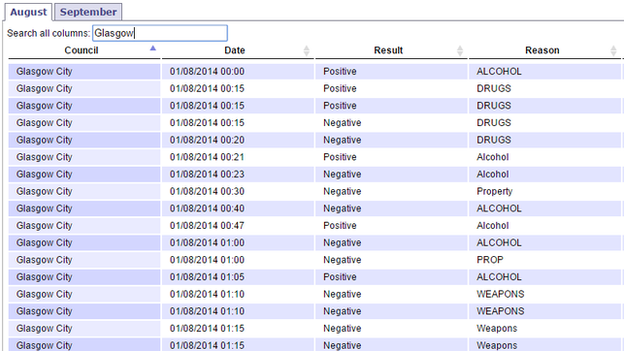
BBC Scotland has created a searchable database of recent stop-and-search data
Assistant Chief Constable Wayne Mawson defended the stop-and-search tactic.
He said: "Stop search preventative successes can be judged through reductions in violent crime, anti-social behaviour and disorder in areas where the tactic is used."
Police Scotland announced on Tuesday that recorded crime was at a 40-year low, with violent crime down by 10%.
"These are the outcomes Police Scotland is seeking with the intelligent use of stop search, directed to address the specific problems," Mr Mawson said.
You can also explore the stop-and-search data using the INTERACTIVE MAP, external developed by BBC Scotland.
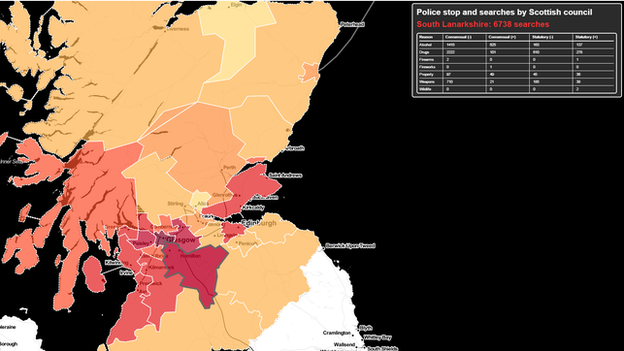
BBC Scotland has created an interactive map of recent stop-and-search data
But Kath Murray, an academic researcher at the University of Edinburgh, has questioned the force's claim that stop-and-searches have played a part in reduced levels of crime in Scotland.
"Clearly, the tactic can disrupt crime, for example, by the confiscation of a weapon or drugs," she said.
"However, as the Scottish Police Authority (SPA) concluded earlier this year, there appears to be no evidence to support a causal relationship between stop search levels, and levels of violent crime or anti-social behaviour."
'Efficient and effective'
The SPA reviewed the force's use of stop-and-search in May this year following concerns about the increasing use of the controversial tactic.
But an SPA spokesman downplayed the fact that the majority of consensual searches yielded negative results.
"The SPA supports the concept of searches taking place on the right people, in the right place and at the right time as long as it is intelligence-led and proportionate to the risk of offending, crime rate and threat," the spokesman said.
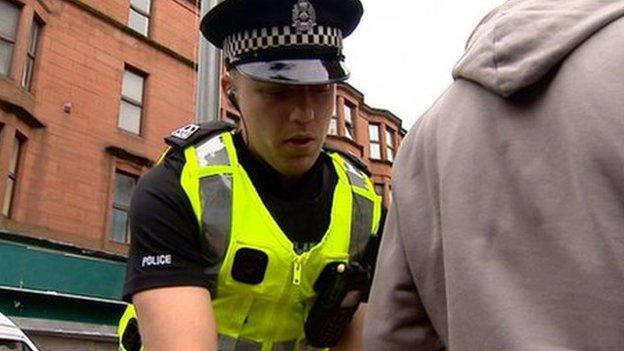
"If this is achieved, the SPA believes that the stop-and-search tactic can be viewed as an efficient and effective use of resources."
However, the police watchdog noted in its formal review, external that the use of consensual searches - which is not provided for in legislation and does not require officers to inform suspects that they may refuse a search - is not permitted in London or anywhere else in the UK.
Since this review Police Scotland has established a National Stop and Search Unit to ensure consistent practice, as well as implement a best practice pilot in Fife.
Under the pilot the details of every person stopped and searched, and the reason why, will be recorded.
The use of non-statutory stop-and-search on children aged 12 and under was also abolished.
'High baseline'
The data obtained by BBC Scotland reveals a significant decrease from the 126,273 searches conducted during the same period in 2013.
But Ms Murray, whose doctoral thesis examines the development of stop-and-search in Scotland, warned that this decline should be put into context.
"Whilst this fall in the level of stop-and-searches is welcome, some caution is required, given that the drop is from an exceptionally high baseline," she said.
"In other words, the level of stop-and-search in Scotland remains high, particularly compared to England and Wales. "
Official figures from London's Metropolitan force, external reveal that Police Scotland conducted three times as many searches during this two-month period than the capital's force - a force which polices a population greater than that of Scotland.
"Consensual searches are an informal way of policing, which don't require reasonable suspicion, or indeed, any standard of suspicion, only verbal agreement," Ms Murray said.
"As a result, detection rates tend to be low; particularly compared to statutory searches, which do require reasonable suspicion."
She said the tactic could be linked to performance management techniques and targets which encourage the use of stop-and-search.
She added: "Put simply, it's an easier way of searching people. It is, however, a controversial tactic which is difficult to reconcile with the idea of intelligence-led policing."
The data also revealed:
Compared with the same time period in 2013, the number of stop-and-searches declined in all council areas with the exception of Fife;
The most searches were conducted in Glasgow (23,419), North Lanarkshire (7,178) and South Lanarkshire (6,738);
The fewest searches were conducted in the Western Isles (8);
Most searches were made for drugs (46%), alcohol (29%) and weapons (19%);
There were low detection rates for searches for drugs (14%) and weapons (4%);
A single officer in Inverclyde was responsible for conducting 744 searches with a 15% detection rate;
83% of searches were conducted on males;
Most searches were performed on Caucasians - however, analysis of the data does reveal detection rates among members of the Pakistani (11%) and Caribbean (6%) communities were lower than those identified as "white Scottish" (20%).
- Published25 November 2014
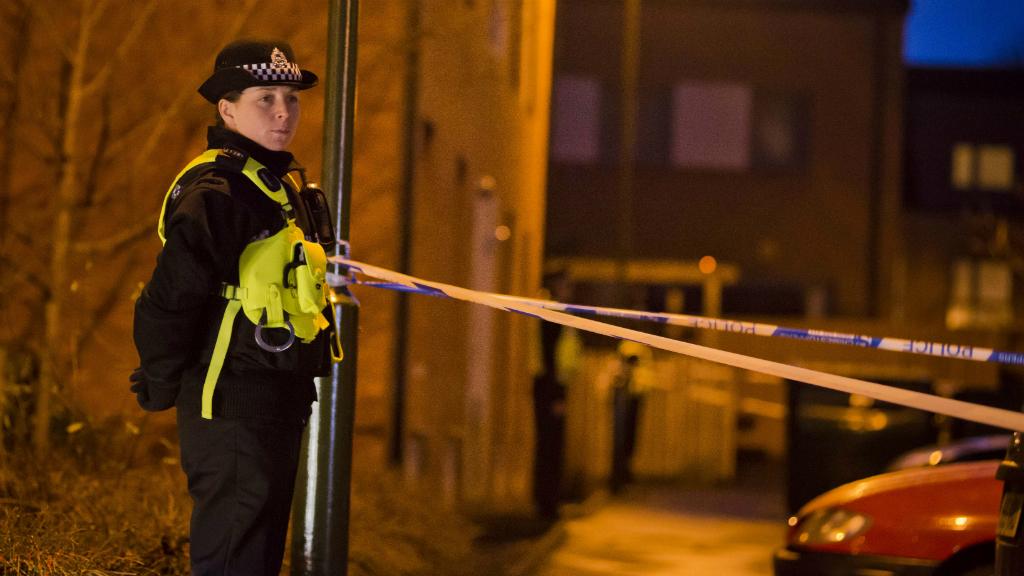
- Published19 June 2014
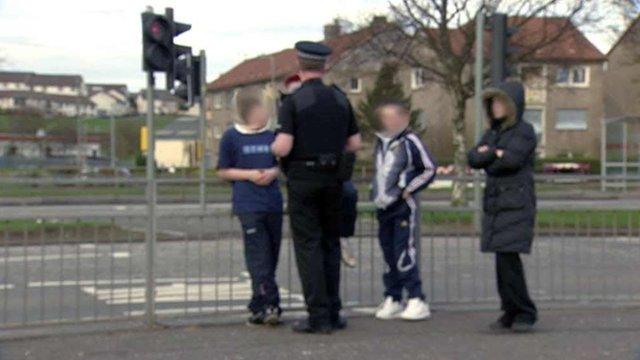
- Published30 May 2014

- Published30 April 2014
